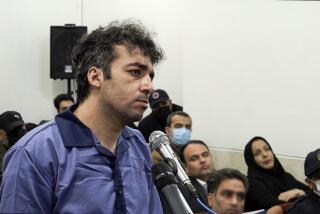Freed After Terror Case, 4 Sue Officials
- Share via
Four Iranian brothers jailed more than three years as security threats and accused of supporting terrorists sued former Atty. Gen. John Ashcroft, FBI Director Robert Mueller III and other officials Monday, charging that the government held them illegally as punishment for refusing to work as informants.
The suit, filed in U.S. District Court in Los Angeles, is the latest salvo in a drawn-out legal battle between the Mirmehdi brothers and the federal government, which accused them of having ties to a terrorist organization but charged them with violating immigration law and has failed in attempts to deport them to Iran. The brothers were released in 2005.
The 49-page complaint says the government, through FBI Agent Christopher Castillo, took punitive action against the brothers -- Mohsen, Mohammad, Mojtaba and Mostafa -- because of their refusal to work as informants. Castillo, a defendant in the suit, relied on informants who falsely identified the brothers as associates of the Mujahedin Khalq, or MEK, according to the lawsuit. The MEK is an Iranian opposition group that has been on the State Department’s list of terrorist organizations since 1997 but has dozens of supporters in Congress.
“Castillo persisted for years in his efforts to force their cooperation through continued punitive detention, even after admitting that a crucial informant had been ‘just speculating’ when he described the Mirmehdis as associates of the MEK,” the lawsuit stated. “Castillo approached the Mirmehdis on no less than five occasions to demand their cooperation in exchange for freedom.”
The brothers admit attending demonstrations in the United States sponsored by the MEK against the Iranian government, but they deny being members or associates.
Mohsen Mirmehdi said the lawsuit, which asks for attorney fees and unspecified damages, is intended to hold government officials accountable.
“Here we have the rule of law. If an average citizen is accountable for what he does, so are government officials,” Mirmehdi said in an interview. “They accused us of something we weren’t a part of. They ruined our reputations and our business.”
The brothers live in the San Fernando Valley, where three of them work as real estate agents.
Thom Mrozek, spokesman for the U.S. attorney’s office in Los Angeles, declined to comment Monday because his office had not seen the lawsuit. FBI spokeswoman Laura Eimiller in Los Angeles also declined to comment.
The brothers were arrested Oct. 2, 2001, and freed March 16, 2005, after a lengthy appeals process. They were among dozens of Muslims detained after the Sept. 11, 2001, attacks as terror suspects or for immigration law violations.
According to the lawsuit, the brothers could have been released on bond as early as Dec. 10, 2001, were it not for Castillo’s “false and misleading testimony” during a hearing in which he portrayed the brothers as security threats. The suit says the FBI agent was the government’s only witness.
The lawsuit also presents a long list of alleged mistreatment of the brothers while in U.S. custody, including being locked up for up to 23 hours per day, being strip-searched after every visit with their attorneys and illegal monitoring of their phone calls with attorneys.
Throughout their legal battle, the Mirmehdis refused to compromise with U.S. officials, even when it came to getting their freedom. They rejected the government’s first attempt to release them in February 2005, because they did not like the conditions governing their freedom.
The government later amended the conditions, but the Mirmehdis refused to sign the new documents. Finally, officials at the Terminal Island immigration detention facility forced them to leave without signing the documents.
An immigration appeals board ruled that the Mirmehdis have no ties to terrorism but upheld their deportations. It is not clear where they could be deported to, because immigration judges barred their deportation to Iran, where they could be tortured for anti-government activities. It is also unlikely that a third country will accept them because the U.S. government has accused them of terrorism.
More to Read
Sign up for Essential California
The most important California stories and recommendations in your inbox every morning.
You may occasionally receive promotional content from the Los Angeles Times.













